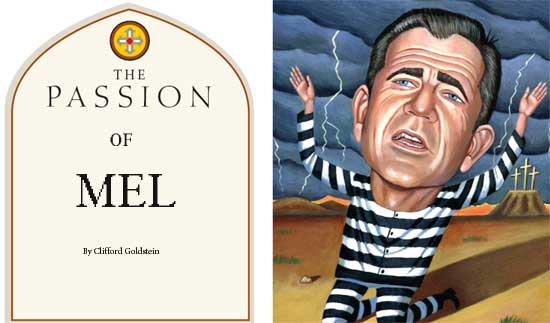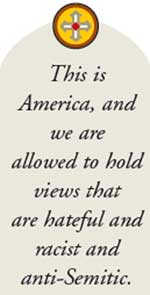The Passion of Mel
Clifford R. Goldstein January/February 2007
Getting your Trinity Audio player ready...

By now the summer of 2006 has faded into memory, and what a summer it was! First, there was the Israel-Hezbollah war, the foiled Muslim terrorist plot to blow up airlines heading to the United States, Iran's continued defiance of United Nations' mandates to stop uranium enrichment, and the airline crash in Kentucky. And of course there was news of the downward spiral in Iraq, even to the point that the Pentagon itself warned of an impending civil war; something that could not only ignite internecine conflict in the combustible Middle East, but send the whole world economy into a depression.
And, yes,. . . there was Mel Gibson's drunken tirade in a police station about the Jews.
Now that there's a little distance on the Gibson thing, and "passions" have cooled, maybe we can take another look at it.
For starters, we should remember that Gibson was in jail for drunken driving, not for making anti-Semitic remarks. However egregious the results can sometimes be, freedom of speech and freedom of religion include the kind of speech and kind of religion we hate and even find horrifically offensive. If free speech includes everything from Nazis marching in Illinois, to flag burning, then certainly it must include a famous actor/director's tirade in a drunk tank.
Gibson's case, however, was a bit different. For movie directors, timing is crucial, and Mel couldn't have picked a "better" time to utter the worn-out canard about Jews starting wars. After all, the Israel-Hezbollah war had just begun, and though little doubt exists as to who started the war and who the bad guys were (after all, even the European Union has labeled Hezbollah a terror group), whenever things heat up in the Middle East with Israel, the atmosphere can get tense and sensitive, and so Gibson's rant was in peculiarly bad taste.
But on another level, here was the man who had produced The Passion of the Christ—one of the most widely viewed movies in history about Jesus. I saw the movie twice, and I came away impressed about just how hard Gibson tried to make it not anti-Semitic. Though I don't know his mind, it was as if Gibson, being sensitive to the problem that this story has caused, purposely tried to make it as anti-inflammatory as possible.

You wouldn't have known that by reading some of the reviews, however. The worst was Leon Wieseltier's cover article in the New Repiblictitled "Crimes of the Passion," in which he excoriated the movie, especially one scene that had Caiaphas, the high priest who had condemned Jesus, coming out to see Him hang on the cross. Wieseltier went apoplectic, arguing that the Gospels never put Caiaphas there at the cross. Of course they didn't, Leon, but they put other priests there, and by making Caiaphas the one who does appear, instead of others, Gibson helped stem the damage, limiting Jewish culpability by limiting the number of priests involved.
If Wieseltier was upset about scenes that weren't in the Gospels, he should have complained about the fictitious dialogue between the Jew who had carried Christ's cross and became a follower of Jesus (and hence one of the film's good guys) and the Roman soldier who cursed him as a Jew—another attempt by Gibson, it seemed to me, to show Jews on both sides of the divide.
As Gibson himself said about the movie, and the Jews: "To be certain, neither I nor my film is anti-Semitic.. . . The Passion is a movie meant to inspire, not offend.. . . My intention in bringing it to the screen is to create a lasting work of art and engender serious thought among audiences of diverse faith backgrounds (or none) who have varying familiarity with this story.
"If the intense scrutiny during my 25 years in public life revealed I had ever persecuted or discriminated against anyone based on race or creed, I would be all too willing to make amends. But there is no such record.
"Nor do I hate anybody—certainly not the Jews.. . . They are my friends and associates, both in my work and social life. Thankfully, treasured friendships forged over decades are not easily shaken by nasty innuendo.
"Anti-Semitism is not only contrary to my personal beliefs, it is also contrary to the core message of my movie.. . . For those concerned about the content of this film, know that it conforms to the narratives of Christ's passion and death found in the four Gospels of the New Testament.. . . This is a movie about faith, hope, love and forgiveness—something sorely needed in these turbulent times."
Of course, after Gibson's drunken debacle, those of us who had been passionately defending the movie against the charges of anti-Semitism were put in a hard spot. My mother, who had been offended by the movie from the start (though I don't think she saw it) had called me up and said, "So you still think Gibson doesn't hate Jews?" What could I say, other than that if he does, it didn't come through in the flick, though it's going to be a lot harder convincing people of that now than before.
So, is Mel an anti-Semite? I've read Jewish people who are his friends and who say that he's not, that he's never shown any proclivity that way, though few could doubt that his 85-year-old father, Hutton Gibson, is. The old man caused a furor when, right before the movie came out, he talked about how exaggerated Jewish deaths in the Holocaust were (It's all—maybe not all fiction—but most of it is), and how the Jews were involved in a worldwide conspiracy to create "one world religion and one world government." Not exactly the best prerelease publicity for a movie already tainted, however unfairly, with the charge of anti-Semitism.
On the other hand, if Mel Gibson were an anti-Semite, so what? It still didn't come through in the movie, despite the complaints to the contrary. And even if he were, he wouldn't be the first and, unfortunately, not the last. This is America, and we are allowed to hold views that are hateful and racist and anti-Semitic. We are even allowed to express those views, too. This is what living in a free society is all about. There are lines, and the lines need to be drawn, and the essence of deciding what our freedoms do and do not include is, ultimately, knowing where to draw those lines. Fortunately for all of us, including Mel Gibson, those lines haven't been drawn—expect with some notable exceptions—on what we write or say, even in the drunk tank.
At the same time, in such a highly competitive society as ours, folks have to be prepared to deal with the consequences of such expression, and Gibson faced an onslaught of publicity and media attention that left him, no doubt, pummeled. Is his career ruined? I hope not. I hope the Jewish community will take him at his word, and accept his apology. For his part, it would do an immense amount of good to openly and powerfully repudiate his father's views. Not his father—just his father's views. He certainly should have done that by now.
In the end, what Gibson's tirade has shown is that freedom comes with a cost, and as our noble experiment has proved over and over again through the past 200 years, that cost has been more than worth it.
Article Author: Clifford R. Goldstein
Clifford Goldstein writes from Ooltewah, Tennessee. A previous editor of Liberty, he now edits Bible study lessons for the Seventh-day Adventist Church.